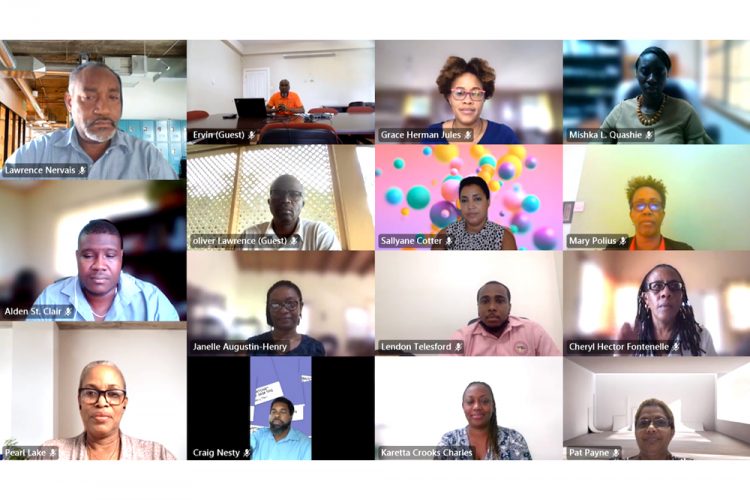ECTEL/NTRC hold 22nd Consultative Forum

A RANGE OF issues touching on telecommunications was addressed last week Monday, March 21 at a joint consultative forum led by the Eastern Caribbean Telecommunications Authority (ECTEL).
The 22nd ECTEL/National Telecommunications Regulatory Commission (NTRC) Consultative Forum, held virtually, aimed to ensure that all parties were fully aware of the numerous projects being undertaken to improve electronic communications service to consumers in the ECTEL Member States, a release from ECTEL says. The session was also an opportunity to introduce new Commissioners to the team and to discuss any matters affecting the NTRCs and the directorate of ECTEL.
Some of the issues identified by the NTRCs and discussed at the Forum included – credit expiration in the ECTEL prepaid market, and spectrum interference experienced by television and radio stations from neighbouring islands. In response, ECTEL provided an update on the status of the Frequency Allocation Table and Regional Spectrum Plan, which once ratified by the ECTEL Council of Ministers, will greatly assist in reducing incidences of radio frequency interference by ensuring that licensees are not operating on the same frequency.
The NTRCs also provided an update on their individual Universal Service Fund (USF) Projects. The USF aims to support the expansion of electronic communications services, particularly to the underserved, who currently do not have sufficient and affordable access.
Additionally, members of the Directorate of ECTEL’s Leadership Team delivered presentations on some of the projects being undertaken including the Implementation of the Retail Price Regulation Regime (RPRR) and the Integrated Spectrum Monitoring and Management System (ISMMS). ECTEL’s acting Director of Economics and Finance, Ferdil Felix-Polius, indicated that the RPRR includes a price cap on three categories of fixed voice service being provided by Cable & Wireless Limited as well as an obligation on Cable & Wireless Limited and Columbus Communications Limited to provide a basic broadband plan that meets some key requirements in Grenada, St Lucia and St. Vincent and the Grenadines. According to Felix-Polius, the RPRR also features a set of practices or “Mobile Consumer Safeguards” which would regulate how mobile service providers engage retail customers. These safeguards include, but are not limited to how mobile service providers notify both national and mobile roaming retail customers on whether a mobile service is being used within or out of a bundle allowance and the options available to these retail customers who have exhausted the bundle allowance to continue using that service and the prices of these options. The NTRCs used the Forum to provide a status update on the implementation of the RPRR in their respective Member States.
Thereafter, ECTEL’s Director of Technical Service, Lawrence Nervais provided an update on the ISMMS project. The software application is dubbed Spectrum-E and is being rolled out in all ECTEL Member States with the aim of providing e-licencing
capabilities to electronic communications licensees. The ISMMS project once completed, will provide remote spectrum monitoring and automated licence renewal notification, among other things. Nervais said to date, the NTRCs have used the platform to process information regarding equipment type approval; amateur licensing and broadcast services. Additionally, maritime mobile ship station certification; individual licensing; and fixed and mobile frequency authorisations are available to be used on the e-licencing platform. Following the presentation by Nervais, Timothy Scott, one of the representatives from NTRC Grenada delivered a demonstration of the Spectrum-E software that is currently being utilised.
In closing, ECTEL’s Acting Managing Director, Cheryl Hector Fontenelle provided an update on the promulgation of the Electronic Communications Bill in the Member States.
She said: “So far St. Kitts and Nevis has passed the Electronic Communications Bill (known as the EC Bill) and we expect that it will be brought into force before the end of the year. We are making good progress in St Lucia, as ECTEL is actively engaged with the Ministry of Telecommunications and the Attorney General Chambers in finalising the EC Bill.” “ Progress has also been made in the Commonwealth of Dominica, where the Attorney General Chamber’s has submitted the EC Bill to a subcommittee of Cabinet, additionally the Ministry of Telecommunications and Broadcasting is ramping up its public relations machinery on the EC Bill. We are also working with Grenada and St. Vincent and the Grenadines on this initiative,” Fontenelle continued.
“ We believe that all Member States are working towards promulgating the EC Bill and approving the suite of regulations needed to deal with some of the more vexing matters that have been plaguing the sector for some time now.”
ECTEL is the regional regulatory body advising the NTRCs on Electronic Communications/Telecommunications matters in its five (5) Member States namely; the Commonwealth of Dominica, Grenada, St. Kitts and Nevis, St Lucia and St. Vincent and the Grenadines.









